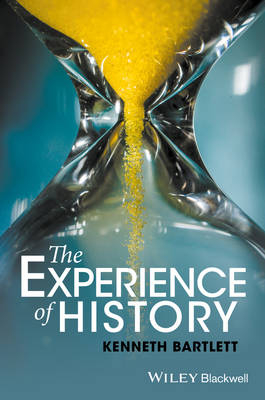
The Experience of History
Wiley-Blackwell (Verlag)
978-1-118-91201-0 (ISBN)
- Titel z.Zt. nicht lieferbar
- Versandkostenfrei
- Auch auf Rechnung
- Artikel merken
Defines history as a discipline and the role of historians within it
Addresses the analytical and critical thinking skills needed to engage with the past
Discusses a variety of important topics in the study of history, such as historical evidence, primary documents, divisions of history, forms of historical writing, historiographical traditions, and recent categories of historical research
Written by a renowned scholar of European history, this work helps students to become discerning examiners of history and historical evidence in a variety of modern settings like art, architecture, film, television, politics, current events, and more.
Learn more about the author and his passion for history in this interview with popular blog Five Books: http://fivebooks.com/interview/ken-bartlett-renaissance-books/.
Kenneth Bartlett is Professor of History and Renaissance Studies at the University of Toronto, Canada. He is former President of the Canadian Society for Renaissance Studies, was the Founding Director of the University of Toronto Art Centre, and sat on the board of the Gardiner Museum of Ceramic Art, and served as editor of Renaissance and Reformation/Renaissance et Réforme. As a Renaissance specialist, he is author of numerous publications, including A Short History of the Italian Renaissance (2013), The Northern Renaissance and the Reformation (with Margaret McGlynn, 2013), and The Civilization of the Italian Renaissance (revised edition, 2011). Bartlett has produced several multi-part video series, including The Smithsonian Essential Italy (2015), The Great Tours: Experiencing Medieval Europe (2013), The Development of European Civilization (2010), and The Italian Renaissance (2005). He has published articles and conducted workshops in Europe, China, the Middle East, and North America on university faculty development and pedagogy, and in 2005, he was awarded the prestigious 3M National Teaching Fellowship.
Preface viii
1 Introduction 1
We are All Part of the Evidence 4
A Personal Example 6
2 The Historian not the History 12
Ideological History 14
Ethnic or National History 17
Distant Voices 18
Historical Style or Genre 20
The Older Historian 21
History by Non‐Historians 23
Historical Jargon 25
History in Translation 26
3 If not the Historian, then Certainly the Evidence 28
The Nature of Evidence 28
Taxation Records 30
Court or Legal Documents 32
Eye‐Witness Evidence 33
Using Evidence Requires Skill and Experience 35
Drawings as Evidence 36
Photographs as Evidence 37
Aural Evidence 38
Missing or Negative Evidence 39
Conclusion 45
4 The Periods and Divisions of History 46
Historical Periodization: History as Chunks of Time 46
The Example of the Middle Ages 47
Historical Periods Defined by Dynamic Ideas 49
Historical Periods Defined by Great Men or Women 54
Historical Periods Defined by Specific Years or Centuries 56
The Study of History through Geographical Categories 58
History as Chunks of Space 60
5 The Many and Various Forms of Historical Writing: The More Traditional Structures 64
The Chronicle 65
Political History 67
Diplomatic History 68
Legal History 69
Military History 69
Economic History 70
Subgenres of Economic History 73
Cultural and Intellectual History 73
Church or Confessional History 76
Jewish History 78
Histories of other Heterodox Religious Communities 79
6 The Many and Various Forms of Historical Writing: More Recent Categories of Historical Research 81
Social History 81
Prosopography 84
Gendered Histories 85
Women’s History 86
Feminist History 87
Gender History 88
Queer History 89
Children’s History 91
Transnational History 93
Diaspora Studies 94
Holocaust Studies 95
Genocide Studies 96
World History 97
Big History 98
7 The Writing of History 100
The Writing of History in the Past 101
The Deeds of Great Men 101
History as a Divine Plan 102
The Scientific Revolution, The Enlightenment, and the ‘Laws’ of History 103
History and Social Darwinism 104
Writing History After the Second World War 106
The Writing of History Today 107
An Example 108
Framing the Question 109
The State of the Question 110
Deciding on a Beginning and an End 111
The Contract with Your Audience 112
Structure 113
A Conclusion 114
Bibliographies and Notes 114
Maps and Illustrations 116
Envoi 117
8 Experiencing History 119
History Around Us 119
Museums and Art Galleries 125
History as Breaking News 128
Film and Television 129
Electronic Records, Social Media, and History 131
History from Evidence on the Internet 134
9 Conclusion 136
We are All Historians 136
We are All Disciples of Descartes 138
Some Final Words 140
Suggestions for Further Reading 142
Index 145
| Erscheinungsdatum | 01.01.2017 |
|---|---|
| Verlagsort | Hoboken |
| Sprache | englisch |
| Maße | 152 x 231 mm |
| Gewicht | 340 g |
| Themenwelt | Geisteswissenschaften ► Geschichte ► Allgemeine Geschichte |
| Geisteswissenschaften ► Geschichte ► Geschichtstheorie / Historik | |
| ISBN-10 | 1-118-91201-2 / 1118912012 |
| ISBN-13 | 978-1-118-91201-0 / 9781118912010 |
| Zustand | Neuware |
| Informationen gemäß Produktsicherheitsverordnung (GPSR) | |
| Haben Sie eine Frage zum Produkt? |
aus dem Bereich


